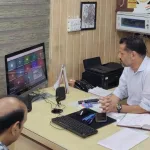EXAM PREPARATION
As the countdown for the final board examination has begun, students across the academic spectrum are bracing themselves for the ultimate test of their knowledge and understanding. The last days leading up to the exams are critical, representing the final stretch where every moment counts. The last 15-20 days before exams can be both daunting and exhilarating. On one hand, there is a sense of urgency as the countdown begins, and every hour seems precious.
On the other hand, there is a glimmer of hope as the finish line draws near, fueling determination and motivation. To navigate this critical period effectively, a comprehensive approach is essential. By fine-tuning understanding, refining exam strategies, utilizing supplementary resources, practicing active recall and spaced repetition, and maintaining a healthy balance, students can optimize their preparation and enter the exam room with confidence. This article explores the importance of each component in this phase of the study plan, highlighting how they collectively contribute to readiness and excellence.
Period of Consolidation and Review (Day 1-7)
Firstly, this is the time for intensive revision. Intensive revision sessions involve concentrated and focused study periods aimed at reinforcing core concepts and addressing challenging areas. These sessions are characterized by their depth of focus and targeted approach, allowing students to delve deeply into the material and solidify their understanding. Identify the topics or areas where you face the most difficulty or uncertainty. These challenging areas may require additional attention and focused study to grasp fully. Allocate dedicated time during your revision sessions to tackle these areas systematically.
Students should use mnemonics. Mnemonic devices are memory aids or techniques that help facilitate the recall of information. They work by associating the material to be remembered with familiar or easily remembered cues. Examples of mnemonic devices include acronyms, acrostics, visualization techniques, and rhymes.
As the saying goes, practice makes the man perfect. So the students should focus on practicing more and more. Choose practice tests or past exam papers that closely resemble the format and content of the upcoming exams. Replicate the conditions of the actual exam as closely as possible. Find a quiet and distraction-free environment to take the practice test. Set a timer to match the duration of each section or the entire exam. Work through the practice test methodically, answering each question to the best of your ability. Avoid the temptation to look up answers or consult your notes during the test, as this won’t accurately reflect your preparedness. Practice managing your time effectively during the test. Allocate a specific amount of time to each question or section, and stick to these time limits to ensure you complete the entire test within the allotted timeframe.
Once you’ve completed the practice test, review your answers carefully. Compare your responses to the correct answers provided in the answer key or marking scheme. Take note of any questions you answered incorrectly or struggled with. Analyze the reasons behind any mistakes or incorrect answers. Was it due to a lack of understanding of the concept, misinterpretation of the question, or careless errors? Identifying the root cause of your mistakes is crucial for improvement.
Calculate your score for the practice test based on the scoring criteria provided. This will give you a clear indication of your performance and areas of strength and weakness. Based on your performance in the practice test, identify areas where you struggled or performed below your expectations. These could be specific topics, concepts, or types of questions that require further review and reinforcement.
Look for patterns or trends in your mistakes. Are there particular types of questions you consistently struggle with? Do you tend to make similar errors across different subjects or topics? Recognizing these patterns can help you target your efforts more effectively.
Prioritize revision based on the areas identified for improvement. Allocate additional study time to these topics or concepts, using targeted revision strategies such as focused reading, practice problems, or seeking clarification from teachers or peers.
Period of Active Learning and Application (Day 8-11)
Engaging in active learning methods that require students to engage cognitively with the material, rather than passively receiving information. This approach fosters critical thinking, problem-solving skills, and long-term retention. One effective way to reinforce learning is to teach the material to someone else. This could be a study partner, family member, or even an imaginary audience. By explaining concepts in your own words, you solidify your understanding and uncover any gaps in knowledge.
Test your understanding through self-quizzing or self-testing. Create flashcards, quizzes, or practice questions based on the material you have studied and challenge yourself to recall key information. This active retrieval process strengthens memory and enhances learning.
While active learning and application are important, it is also crucial to balance these activities with periods of reflection and consolidation. Take time to review your experiences, consolidate your learning, and make connections between new information and existing knowledge.
Period of Fine-Tuning and Refinement (Day 12-15)
Review your notes and previous assessments to pinpoint any remaining areas of weakness or topics that you find challenging. Allocate dedicated time to revisit these topics, focusing on understanding rather than rote memorization. Work through practice problems or questions related to the topics you are revising. Applying your knowledge in context helps solidify understanding and prepares you for similar questions on the exam.
Don’t hesitate to reach out to your teachers, parents, or peers for assistance if you encounter difficulties during the revision process. They can provide clarification, additional resources, or guidance on how to approach challenging concepts. Engage in active recall exercises by testing yourself on key concepts without referring to your notes. This retrieval practice strengthens memory and enhances retention.
Remember to prioritize self-care and well-being during this phase. Take regular breaks, get adequate sleep, and engage in activities that help you relax and recharge. A rested mind is better equipped to absorb and retain information effectively. While it’s important to dedicate time to fine-tuning your understanding and refining your exam strategy, avoid overloading yourself with excessive studying. Find a balance that allows you to maintain focus and motivation without experiencing burnout.
Believe in your efforts and enter the examination hall with hope and confidence. Keep in mind, exams are a just a part of your academic journey and not the whole of it. It’s important to acknowledge that exam results matter, but they’re not the ‘be all and end all’. Remember, the words of Prime Minister Shri Narendra Modi that competition and challenges act as inspiration in life, but competition must be healthy. “Focus on doing your best, don’t compete with your peers. Use your peer’s success as a source of inspiration.”
(Author is Senior Academic Officer, State Council of Educational Research and Training J&K. Email: [email protected])





